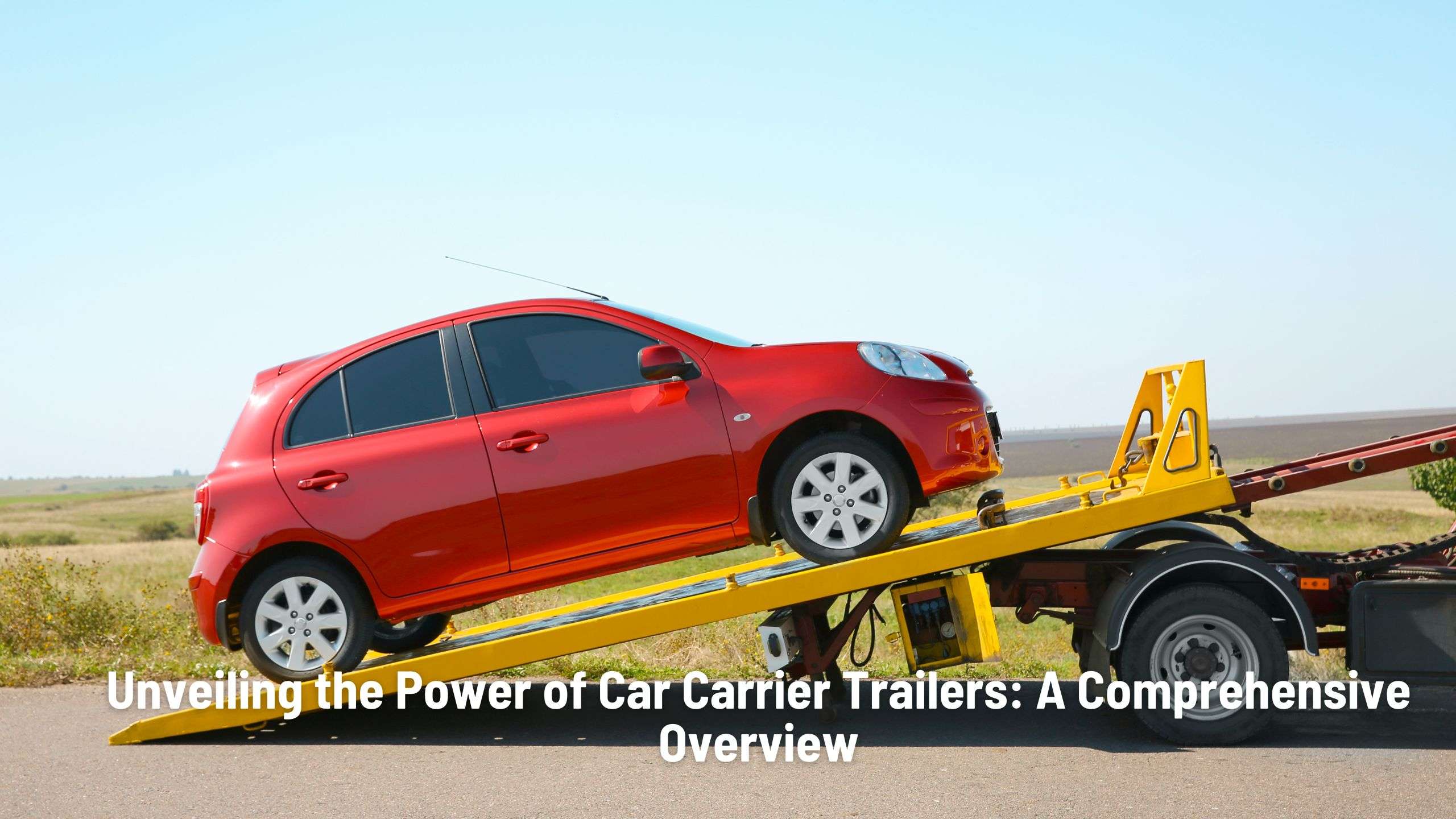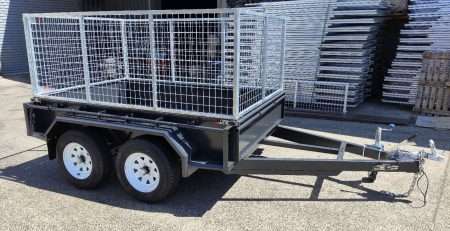
Unveiling the Power of Car Carrier Trailers: A Comprehensive Overview
Understanding Car Carrier Trailers
Car carrier trailers, also known as car hauliers, are specialised trailers designed to transport vehicles from one location to another safely and efficiently. These trailers play a crucial role in the automotive industry, providing a reliable means of transporting cars for various purposes, including car carrier rental, car carrier transport, car carrier truck, car carrier shipping, and car carrier for sale (Montway).
What are car carrier trailers?
Car carrier trailers are specifically designed to efficiently transport passenger vehicles via trucks. These trailers are equipped with various features to ensure the safe and secure transportation of vehicles. They often have built-in ramps and power hydraulics for loading and off-loading cars, making the process smoother and more efficient (Wikipedia).
Car carrier trailers are commonly used for long-distance shipments, whether it’s for commercial purposes or personal needs. They are designed to accommodate different types of vehicles, from small cars to larger SUVs and trucks. The trailers are typically attached to the tractor using a fifth-wheel coupling, which provides stability and control during transportation.
Benefits of Using Car Carrier Trailers
Using car carrier trailers offers several benefits for both businesses and individuals. Here are some key advantages:
- Efficient Transportation: Car carrier trailers provide an efficient means of transporting multiple vehicles at once. This reduces the overall transportation time and cost, especially for car dealerships and manufacturers that need to move a large number of vehicles.
- Safety and Protection: Car carrier trailers are designed with safety in mind. They often feature secure tie-downs and protective measures to ensure that the vehicles being transported remain safe and undamaged during transit. Enclosed car carrier trailers offer additional protection from the elements, ensuring that high-value or sensitive vehicles are safeguarded.
- Flexibility: Car carrier trailers can transport various types of vehicles, including new cars, classics, project cars, and salvage cars. This versatility makes them suitable for different transportation needs and allows for the transportation of a wide range of vehicles.
- Convenience: Car carrier trailers are equipped with features that make loading and unloading vehicles easier. The ramps can be aligned on a slope, allowing cars to be driven up and secured to the ramp floor. Trailer hydraulics enable tilting in any direction, optimising stacking and loading configurations.
- Secure Storage: Car carrier trailers often have secure storage compartments for the personal belongings of the car owners, providing added convenience and peace of mind during transportation (Source).
By utilising car carrier trailers, businesses and individuals can transport vehicles efficiently, safely, and conveniently to their intended destinations. Whether it’s for commercial purposes or personal needs, these trailers play a vital role in the automotive industry, ensuring the smooth transportation of cars across various distances.
Types of Car Carrier Trailers
When it comes to transporting vehicles, car carrier trailers offer a reliable and efficient solution. There are two main types of car carrier trailers: open car carrier trailers and enclosed car carrier trailers. Each type has its own advantages and is suited for different transportation needs.
Open Car Carrier Trailers
Open-car carrier trailers are the most common type of car carrier trailer. They are widely used for transporting various types of vehicles, including new cars, classics, project cars, and salvage cars. These trailers have an open design, allowing for easy loading and unloading of vehicles.
One of the benefits of open-car carrier trailers is their versatility. They can transport nearly any type of car and can accommodate multiple vehicles at once. In the United States, open-car carriers typically carry between 2 and 9 cars at a time. However, it’s important to note that car trailers can be larger, and in China, double-wide car carriers were once allowed to carry up to 30 cars at a time before size limitations were implemented due to safety concerns.
Open-car carrier trailers provide efficient transportation while keeping vehicles visible during transit. This visibility can be advantageous for car owners who want to keep an eye on their vehicles or showcase them during transportation.
Enclosed Car Carrier Trailers
For those looking for added protection and security during transport, enclosed car carrier trailers are a preferred choice. These trailers provide a safe and discreet way to transport high-value cars, protecting them from the weather and prying eyes. Enclosed trailers are also lower to the ground compared to open car carriers, making it easier to load low-clearance vehicles.
Enclosed car carrier trailers come in various sizes and configurations. Some trailers are single-level, while others are multi-level, allowing for the transportation of multiple vehicles at once. Multilevel enclosed carriers are commonly seen at collector car auctions, shows, and events, providing added protection against the elements and facilitating the transport of a large number of valuable cars nationwide.
These trailers are specifically designed to ensure the safe transportation of vehicles. They often feature ramps, tie-down points, and secure storage compartments for the personal belongings of the car owners. The enclosed design offers additional protection against road debris, dust, and other potential hazards, making it an ideal choice for transporting luxury and high-value vehicles.
Whether you opt for an open car carrier trailer or an enclosed car carrier trailer, it’s important to consider your specific transportation needs and the level of protection required for your vehicles. By choosing the right type of car carrier trailer, you can ensure a safe and efficient transport experience for your valuable assets.
Choosing the Right Car Carrier Trailer
When it comes to selecting the right car carrier trailer for your needs, there are several factors to consider. From the type of trailer to the carrying capacity, making an informed decision is essential to ensuring a safe and efficient transportation process.
Factors to consider
- Type of Car Carrier Trailer: There are different types of car carrier trailers available, including open car carriers and enclosed car carriers.
- Open Car Carrier Trailers: These are the most common type of car carrier trailers and are suitable for transporting a wide range of vehicles, including new cars, classics, project cars, and salvage cars. They can typically transport up to 10 vehicles at a time, making them a cost-effective option for larger shipments (source).
- Enclosed Car Carrier Trailers: Enclosed car carriers provide a higher level of protection and are often used for transporting high-value vehicles, such as luxury, vintage, or exotic cars. These trailers can transport fewer vehicles, usually between 1 and 6, and offer additional security and weather protection.
- Carrying Capacity: The carrying capacity of a car carrier trailer is an important consideration. It determines the maximum weight the trailer can support, ensuring safe transportation. The average carrying capacity for car trailers is around 7,100 lbs, but this can vary depending on the brand and model. Some entry-level car trailers may only support 5,000 lbs, while specialised trailers can have a carrying capacity of 10,000+ lbs. It’s crucial to consider the weight of the vehicles being transported and choose a trailer with a towing capacity that aligns with the total weight (Primo Trailer).
- Budget: Determine your budget for renting or purchasing a car carrier trailer. The cost can vary depending on factors such as trailer type, size, and additional features. It’s important to find a balance between affordability and quality to ensure a reliable and safe transportation experience.
Determining carrying capacity
To determine the appropriate carrying capacity for your car carrier trailer, consider the weight of the vehicles you plan to transport. Compact cars generally weigh less than SUVs, so the towing capacity of the trailer should align with the weight of the vehicles being transported.
When calculating the total weight, don’t forget to account for any additional equipment or cargo that may be carried on the trailer. It’s crucial to adhere to weight limits to ensure the trailer’s stability and avoid potential hazards during transportation.
By carefully considering the factors mentioned above and determining the carrying capacity required, you can make an informed decision when choosing the right car carrier trailer for your specific needs. Whether you opt for an open car carrier or an enclosed car carrier, selecting the appropriate trailer will help ensure the safe and reliable transportation of your vehicles.
Safety Tips for Car Carrier Trailers
Ensuring the safe transportation of vehicles is of utmost importance when using car carrier trailers. By following proper safety protocols, you can minimise the risk of accidents and damage. Here are some essential safety tips to keep in mind:
Pre-Trip Inspections
Before embarking on a journey, it is crucial to conduct a thorough pre-trip inspection of the car carrier trailer. This inspection should include checking the tyres, brakes, and lights and ensuring that all straps and tie-down points are in good condition and properly secured. By addressing any potential issues before hitting the road, you can significantly reduce the chances of mechanical failures or loose restraints.
Proper Vehicle Securing Techniques
Properly securing the vehicles on the car carrier trailer is essential to prevent any movement or damage during transportation. It is recommended to use high-quality, properly rated straps or chains to secure each vehicle. Ensure that the straps or chains are not too loose, which can lead to shifting during transit, or too tight, which can cause unnecessary strain and potential damage to the vehicles. Taking the time to secure the vehicles correctly can provide peace of mind and safeguard against accidents or collisions.
Compliance with Safety Regulations
Adhering to all the relevant safety regulations and requirements is vital for the legal and safe transportation of vehicles using car carrier trailers. Car haulers should have the necessary permits, licenses, and insurance coverage to ensure compliance with local and national regulations. Staying updated with safety standards and maintaining proper documentation will not only protect the car hauler but also provide assurance to customers that their vehicles are in capable hands.
By following these safety tips, you can enhance the security and reliability of car carrier trailer operations. Remember, safety should be the top priority when transporting vehicles, and taking the necessary precautions will help ensure a smooth and incident-free journey. For more information on car carrier trailers and related services, explore our wide range of articles on car carrier rental, car carrier transport, car carrier truck, car carrier shipping, car carrier for sale, car carrier load boards, car carrier service, enclosed car carrier, and car carrier company.
Author
I am Rahatul Ashiq Tamal. Another author of Muscle Trailers. Muscle Trailers is a well-known trailer brand in Sydney, Melbourne & Adelaide

How to Mount a Spare Tire on Your Trailer: A Simple Step-by-Step Guide
Trailer service centers receive over 1 million phone calls and 1.3 million emails each year about trailer maintenance problems....

How to Fix RV Roof Leaks: Simple Roof Leak Detection Guide for Beginners
Did you know DIY RV roof repairs can cost under $50? But undetected leaks could lead to substantially higher repair...

Starting a Food Truck Business in Australia: From Trailer Selection to Launch
The Australian mobile food market has evolved into a billion-dollar industry. This makes a food truck...
